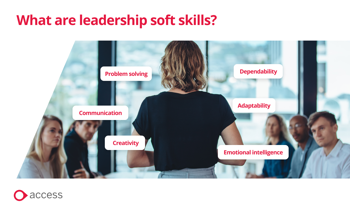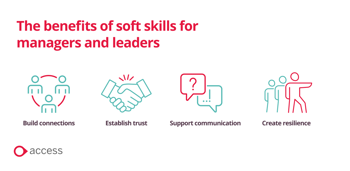10 Essential leadership soft skills (and how to use them)
There are many different types of experience that support the effective management of others and help the wider organisation to thrive. Whether hiring for leadership roles or upskilling your workforce, one consideration that is often overlooked is leadership soft skills. These can be harder to quantify than hard skills, which include having experience in a similar role or being able to use certain business-critical programs, but they are essential to creating a successful team dynamic.
In this article, we’re going to look at what leadership soft skills are and why they’re important, as well as exploring a few examples of soft skills that when developed, turn good managers into great leaders.
In this article we are going to explore:

What are leadership soft skills and why are they important?
Before delving into leadership skills examples, let’s take a quick look at what soft skills are, and how they apply to leadership and management roles. We’ve put together a soft skills list at the end of this section that you might find useful. You can read about these in more detail in our article 10 important soft skills examples and why your workforce needs them.
Soft skills are more general traits that help employees to perform well at their job, and aren’t specific to any one role. Another word for soft skills is interpersonal skills or professional skills, which encompasses skills such as working as a team, showing empathy, and recognising other people’s capabilities and limits.
Bad management can significantly affect employee wellbeing and business performance, leading to higher staff turnover rates and lower profitability. By focusing on improving key leadership skills, you can help to foster a working environment that’s better for employees and profits alike.
Some examples of soft skills include:
- Communication
- Creativity
- Adaptability
- Work ethic
- Emotional intelligence
- Problem solving
- Organisation
- Positive attitude
- Dependability
- Initiative
Leader versus manager – what’s the difference?
To simplify the difference between a leader and a manager, it’s helpful to make a distinction between managing people and managing tasks. Much of a manager’s role focuses on tasks and objectives, and creating strategies to achieve them. However, managers need to be able to inspire and motivate people to achieve these goals, which is a leadership skill. When we consider the roles and responsibilities of a leader versus a manager, we can see a variety of differences between the two, and thus a different, although overlapping, set of essential leadership soft skills.
You don’t need to have the word ‘leader’ or ‘manager’ in your job title to be a person that others rely on for leadership and support. A Team Leader would certainly be considered a leader, not just because of their job title, but also because of the requirements of their role. However, a senior member of their team may also be considered a leader in the eyes of more junior members, as they are able, and expected, to provide support and guidance to those who are less confident or experienced. Similarly, projects that involve collaborating with peers require team members to display leadership skills to complete the project effectively.
Leadership soft skills are therefore not restricted to those in management positions, and are something that employees in many different roles can benefit from learning. Employees who are looking to move into more senior roles, including positions in leadership and management, should also look to cultivate key leadership skills to better their chances of a successful career development. Strengthening leadership soft skills is also important when you want to develop team members in preparation for succession planning, and for filling skills gaps in leadership.
10 Essential soft skills for leadership
Leadership soft skills help employees to better support their teams, aid career development, and allow the wider organisation to thrive. We’ve put together the essential soft skills for leadership, along with examples of how they could be demonstrated in the workplace

The benefits of soft skills for managers and leaders
Don’t be misled by the name; leadership soft skills are anything but soft. In fact, they’re essential strengths that can help leaders to thrive in the workplace while also supporting their teams. Here are some of the benefits of soft skills for managers and leaders.
Build connections
Key leadership skills allow those in managerial positions to build stronger interpersonal connections with employees, helping to boost staff productivity, satisfaction and retention. By building better relationships throughout the organisation, leaders can more effectively manage teams and delegate tasks to meet business objectives.
Establish trust
The stronger a person’s leadership soft skills, the more likely they are to be looked upon as a trusted colleague. As well as gaining the respect of those they manage, showing great leadership skills helps to build the trust of senior managers that they report to.
Support communication
Effective communication is essential throughout all levels of an organisation. Leaders with strong communication skills are able to create relationships that unite teams, departments and upper management, helping to boost morale and complete tasks efficiently.
Create resilience
Learning to adapt to the changing demands of their team and organisation gives managers the tools they need to handle a variety of different situations. Developing their leadership skills helps leaders to inspire their teams, work proactively, and create innovative solutions to problems.
Soft skills and emotional intelligence training for leaders
Upskilling is a vital part of career development for employees of all levels, but it’s important to focus on the right skills for your role, as well as your future career path. As we’ve seen, there are many different benefits of soft skills for managers and leaders. While many of these skills can be gained through experience and self-directed learning, investing in management and leadership soft skills courses allows you to benefit from guided training and support.
Access offers a variety of different courses to support emotional intelligence training for leaders. We’ve put together an overview below of some of our most useful soft skills courses for leaders.
Change management
Our change management training course helps leaders to become more adaptable to different situations.
In this course, we help you to understand your own strengths and weaknesses within the context of change, and cover some useful exercises to help you to think outside of the box and gain a fresh perspective. We also explore the seven steps of the change process, and how understanding them can better prepare you for adapting to change quickly and effectively.
Management and leadership
Our management and leadership training course introduces the key elements of leadership, what it is, and what qualities make a good leader.
In this course, we introduce you to a variety of different leadership styles, helping you to distinguish between them and recognise which ones are most effective for you and the specific members of your team. We also explore a variety of in-depth leadership soft skills, including operational agility, performance management and workplace ethics.
Disciplinary and grievance procedures
Our disciplinary and grievance procedures training course details how to manage issues at work to ensure the best outcome for everyone.
In this course, we examine what grievance and disciplinary procedures are, and explore the guiding principles and government legislation that apply when handling issues in the workplace. We also cover how to establish the facts, the process of conducting a disciplinary hearing, and how to take action to resolve grievances amicably while upholding your employees’ rights.
Leadership soft skills FAQs
Is leadership a hard or soft skill?
Leadership is usually considered to be a soft skill, as it is hard to quantify and is made up of many other skills. Leaders require a variety of different skills in order to effectively motivate and support their teams, including communication, delegation and integrity. However, having worked in previous leadership or managerial positions may be viewed as a hard skill, as it shows previous experience in leading others.
What are soft skills in leadership?
Some examples of soft skills in leadership include communication, empathy, flexibility, self-awareness, problem solving, teamwork, delegation, integrity and conflict resolution.
What’s the difference between soft skills and leadership skills?
Soft skills encompass a wide range of different traits that help people to be effective employees. Leadership skills are those skills, both hard and soft, that relate specifically to managing people and delegating tasks. While there is some crossover between soft skills and leadership skills, they are not one and the same.
What are the advantages of soft skills over hard skills?
Soft skills are often easily transferable, as they tend to relate to emotional intelligence and interpersonal skills. Hard skills, on the other hand, may be more specific to a particular role, such as the ability to use certain software, or having a relevant qualification.
What are the 5 main areas of emotional intelligence?
The five main components of emotional intelligence were defined by American psychologist and science journalist Daniel Goleman as: empathy, effective communication, self-awareness, self-regulation, and motivation. These are all essential leadership soft skills that can help leaders to support teams and develop their careers.
Drive a learning culture with Access Learning

Download our brochure
Our eLearning course catalogue lets you explore our extensive CPD accredited Workplace Soft Skills content.

Speak to an expert
Chat with one of our learning experts and find out how our Workplace Soft Skills courses can help your organisation boost productivity and retain staff.

Schedule a live demo
Explore the features, functionality and benefits our Workplace Soft Skills courses have to offer and ask questions to our learning experts.

